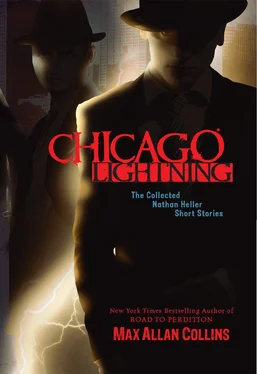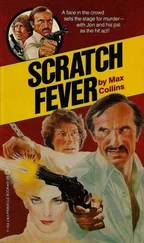Max Collins - Chicago Lightning
Здесь есть возможность читать онлайн «Max Collins - Chicago Lightning» весь текст электронной книги совершенно бесплатно (целиком полную версию без сокращений). В некоторых случаях можно слушать аудио, скачать через торрент в формате fb2 и присутствует краткое содержание. Жанр: Криминальный детектив, на английском языке. Описание произведения, (предисловие) а так же отзывы посетителей доступны на портале библиотеки ЛибКат.
- Название:Chicago Lightning
- Автор:
- Жанр:
- Год:неизвестен
- ISBN:нет данных
- Рейтинг книги:5 / 5. Голосов: 1
-
Избранное:Добавить в избранное
- Отзывы:
-
Ваша оценка:
- 100
- 1
- 2
- 3
- 4
- 5
Chicago Lightning: краткое содержание, описание и аннотация
Предлагаем к чтению аннотацию, описание, краткое содержание или предисловие (зависит от того, что написал сам автор книги «Chicago Lightning»). Если вы не нашли необходимую информацию о книге — напишите в комментариях, мы постараемся отыскать её.
Chicago Lightning — читать онлайн бесплатно полную книгу (весь текст) целиком
Ниже представлен текст книги, разбитый по страницам. Система сохранения места последней прочитанной страницы, позволяет с удобством читать онлайн бесплатно книгу «Chicago Lightning», без необходимости каждый раз заново искать на чём Вы остановились. Поставьте закладку, и сможете в любой момент перейти на страницу, на которой закончили чтение.
Интервал:
Закладка:
“Mother?”
“Rheta.”
“She…she was a lovely girl. A beautiful redhead. Gifted musician…violinist. But she was…sick.”
“Sick how?”
He tapped his head. “She was a hypochondriac. Imagining she had this disease, and that one. Her mother died of tuberculosis…in an insane asylum, no less. Rheta came to imagine she had t.b., like her mother. What they did have in common, I’m afraid, was being mentally deranged.”
“You said you loved her, Earle.”
“I did. Once. The marriage was a failure. I…I had to seek affection elsewhere.” A wicked smile flickered under the pencil mustache. “I’ve never had trouble finding women, Nate. I have a little black book with fifty girl friends in it.”
It occurred to me that a real man could get by on a considerably shorter list; but I keep opinions like that to myself, when given a hundred-buck retainer.
“What did the little woman think about all these girl friends? A crowd like that is hard to hide.”
He shrugged. “We never talked about it.”
“No talk of a divorce?”
He licked his lips, avoided my eyes. “I wanted one, Nate. She wouldn’t give it to me. A good Catholic girl.” Four of the most frightening words in the English language, to any healthy male anyway.
“The two of you lived here, with your mother?”
“Yes…I can’t really afford to live elsewhere. Times are hard, you know.”
“So I hear. Who else lives here? Isn’t there a roomer?”
“Yes. Miss Shaunesey. She’s a high school teacher.”
“Is she here now1;
“Yes. I asked if she’d talk to you, and she is more than willing. Anything to help Mother.”
Back in the library, I sat and spoke with Miss Enid Shaunesey, a prim, slim woman of about fifty. Earle lurked in the background, helping himself to more sherry.
“What happened that day, Miss Shaunesey?”
November 21, 1933.
“I probably arose at about a quarter to seven,” she said, with a little shrug, adjusting her wire-frame glasses. “I had breakfast in the house with Dr. Alice. I don’t remember whether Rheta had breakfast with us or not…I don’t really remember speaking to Rheta at all that morning.”
“Then you went on to school?”
“Yes,” I said. “I teach at Marshall High. I completed my teaching duties and signed out about three fifteen. I went to the Loop and shopped until a little after five and went home.”
“What, at about six?”
“Or a little after. When I came home, Dr. Alice was in the kitchen, preparing dinner. She fried up some pork chops. Made a nice salad, cabbage, potatoes, peaches. It was just the two of us. We’re good friends.”
“Earle was out of town, of course, but what about Rheta?”
“She was supposed to dine with us, but she was late. We went ahead without her. I didn’t think much of it. The girl had a mind of her own; she frequently went here and there-music lessons, shopping.” There was a faint note of disapproval, though the conduct she was describing mirrored her own after-school activities of that same day.
“Did Dr. Wynekoop seem to get along with Rheta?”
“They had their tiffs, but Dr. Alice loved the girl. She was family. That evening, during dinner, she spoke of Rheta, in fact.”
“What did she say?”
“She was worried about the girl.”
“Because she hadn’t shown up for supper?”
“Yes, and after the meal she telephoned a neighbor or two, to see if they’d seen Rheta. But she also expressed a more general concern-Rheta was fretting about her health, you see. As I said, Rheta frequently stayed out. We knew she’d probably gone into the Loop to shop and, as she often did, she probably went to a motion picture. That was what we thought.”
“I see.”
Miss Shaunesey sat up, her expression suddenly thoughtful. “Of course, I’d noticed Rheta’s coat and hat on the table here in the library, but Dr. Alice said that she’d probably worn her good coat and hat to the Loop. Anyway, after dinner we talked, and then I went to the drug store for Dr. Alice, to have a prescription refilled.”
“When did you get back?”
“Well, you see, the drug store is situated at Madison and Kedzie. That store did not have as many tablets as Dr. Alice wanted, so I walked to the drug store at Homan and Madison and got a full bottle.”
“So it took a while,” I said, trying not to get irritated with her fussy old-maid-school-teacher thoroughness. It beat the hell out of an uncooperative, unobservant witness, though. I guessed.
“I was home by half past seven, I should judge. Then we sat down in the library and talked for about an hour. We discussed two books- Strange Interlude was one and the other was The Forsyte Saga .”
“Did Dr. Wynekoop seem relaxed, or was she in any way preoccupied?”
“The former,” Miss Shaunesey said with certainty. “Any concern about Rheta’s absence was strictly routine.”
“At what point did Dr. Wynekoop go downstairs to her consultation room?”
“Well, I was complaining of my hyperacidity. Dr. Alice said she had something in her office that she thought I could use for that. It was in a glass case in her consulting room. Of course, she never got that medicine for me.”
Dr. Wynekoop had been interrupted in her errand by the discovery of the body of her daughter-in-law Rheta. The corpse was face down on the examination table, head on a white pillow. Naked, the body was wrapped in a sheet and a blanket, snugged in around the feet and pulled up over the shoulders, like a child lovingly tucked into bed. Rheta had been shot, once, in the back. Her lips were scorched as if by acid. A wet towel was under her mouth, indicating perhaps that chloroform had been administered. A half-empty bottle of chloroform was found on the washstand. And a gauze-wrapped .32 Smith and Wesson rested on the pillow above the girl’s head.
“Dr. Wynekoop did not call the police?” I asked, knowing the answer. This much I remembered from the papers.
“No.”
“Or an undertaker, or the coroner’s office?”
“No. She called her daughter, Catherine.”
Earle looked up from his sherry long enough to interject: “Catherine is a doctor, too. She’s a resident at the Children’s Department at Cook County Hospital.”
And that was my logical first stop. I took the El over to the hospital, a block-square graystone at Harrison and Ogden; this job was strictly a West Side affair.
Dr. Catherine Wynekoop was a beautiful woman. Her dark hair was pulled back from her pale, pretty face; in her doctor’s whites, she sat in the hospital cafeteria stirring her coffee as we spoke.
“I was on duty here when Mother called,” she said. “She said, ‘Something terrible has happened at home…it’s Rheta…she’s dead…she has been shot.’”
“How did she sound? Hysterical? Calm?”
“Calm, but a shocked sort of calm.” She sighed. “I went home immediately. Mother seemed all right, but I noticed her gait was a little unsteady. Her hands were trembling, her face was flushed. I helped her to a chair in the dining room and rushed out in the kitchen for stimuli. I put a teaspoonful of aromatic spirits of ammonia in water and had her drink it.”
“She hadn’t called anyone bt you, as yet?”
“No. She said she’d just groped her way up the stairs, that on the way everything went black, she felt dizzy, that the next thing she knew she was at the telephone calling me.”
“Did you take charge, then?”
A half-smile twitched at her cheek. “I guess I did. I called Mr. Ahearn.”
“Mr. Ahearn?”
“The undertaker. And I called Dr. Berger, our family physician.”
“You really should have called the coroner.”
Читать дальшеИнтервал:
Закладка:
Похожие книги на «Chicago Lightning»
Представляем Вашему вниманию похожие книги на «Chicago Lightning» списком для выбора. Мы отобрали схожую по названию и смыслу литературу в надежде предоставить читателям больше вариантов отыскать новые, интересные, ещё непрочитанные произведения.
Обсуждение, отзывы о книге «Chicago Lightning» и просто собственные мнения читателей. Оставьте ваши комментарии, напишите, что Вы думаете о произведении, его смысле или главных героях. Укажите что конкретно понравилось, а что нет, и почему Вы так считаете.












